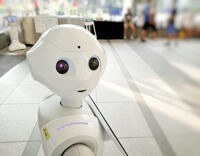3 questions to Claudia Hartwich, Microsoft Germany: The future of work
How can digital working be implemented successfully in the future? To discuss this challenge, we interviewed Claudia Hartwich, HR Director and member of the Management Board at Microsoft Germany.

Claudia Hartwich has been driving transformation and new work issues at Microsoft since 2016 and has been involved in shaping internal change processes. We asked her three questions about the future of work the challenges of digital working.
Almost no area has been hit by the current crisis as hard as the workplace itself. What does that mean for you as Senior HR Director Germany at one of the world’s biggest software companies?
At Microsoft, we have acquired a wealth of experience in terms of flexible working models. Ever since 1998, the concept of trust-based working hours has been an integral part of our agreement with the works council. In 2014, this concept was extended to cover the place of work. However, during the pandemic, home became more than just an office for some, and also served as a playground and classroom. In this respect, it was important to be there for one another.
I was particularly moved by the initiative of one employee, who set up a fairytale hour. The colleagues’ children loved it – and it gave their parents a little respite while they worked from home. Our employee resource groups, such as Parents@Microsoft, made a big impact during this time, and we in the HR leadership team decided to provide them with even more flexibility for switching between childcare and working hours when day care centers and schools are closed.
What advice would you give to companies – how can they continue to make working in the office attractive? How much working from home should and can continue?
Gone are the days of one-size-fits-all solutions, in my opinion. It is important to give people the freedom to choose the solution that is best for them. That applies to both where they work and their working hours. Every individual has different preferences and needs. Work has to be in harmony with their life, and that’s why we talk about a #worklifeflow. And what’s more, autonomy promotes personal productivity.
What needs to be taken into account when it comes to decentralized working? What tips do you have for effectively establishing information chains, even when people are working from home?
Tools that enable collaboration across locations, such as Microsoft Teams, provide the ideal basis. It is also important to make room for interaction – the digital chat when grabbing a coffee in the kitchen, so to speak. Almost everyone is happy when someone gives them a call to ask them how they’re doing.





